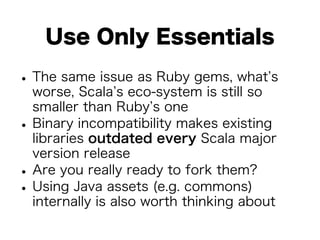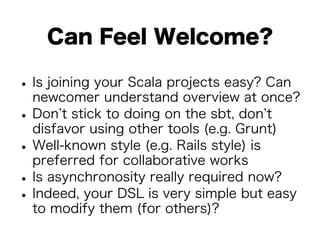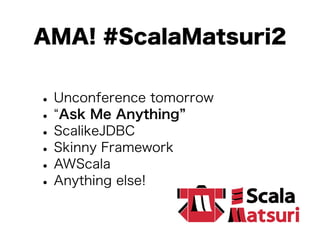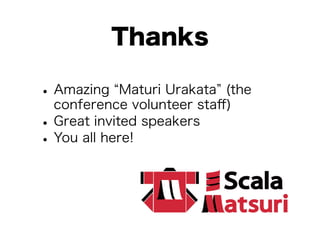Kazuhiro Sera presents on solid and sustainable development practices using Scala, highlighting his projects ScalikeJDBC and the Skinny Framework, both aimed at enhancing web development efficiency. ScalikeJDBC offers a Scala-like API for database interactions, while the Skinny Framework provides a full-stack environment for quick application development. The presentation emphasizes simplicity, immutability, and a lightweight approach to infrastructure, promoting the idea that developers should avoid unnecessary complexity and abstractions.
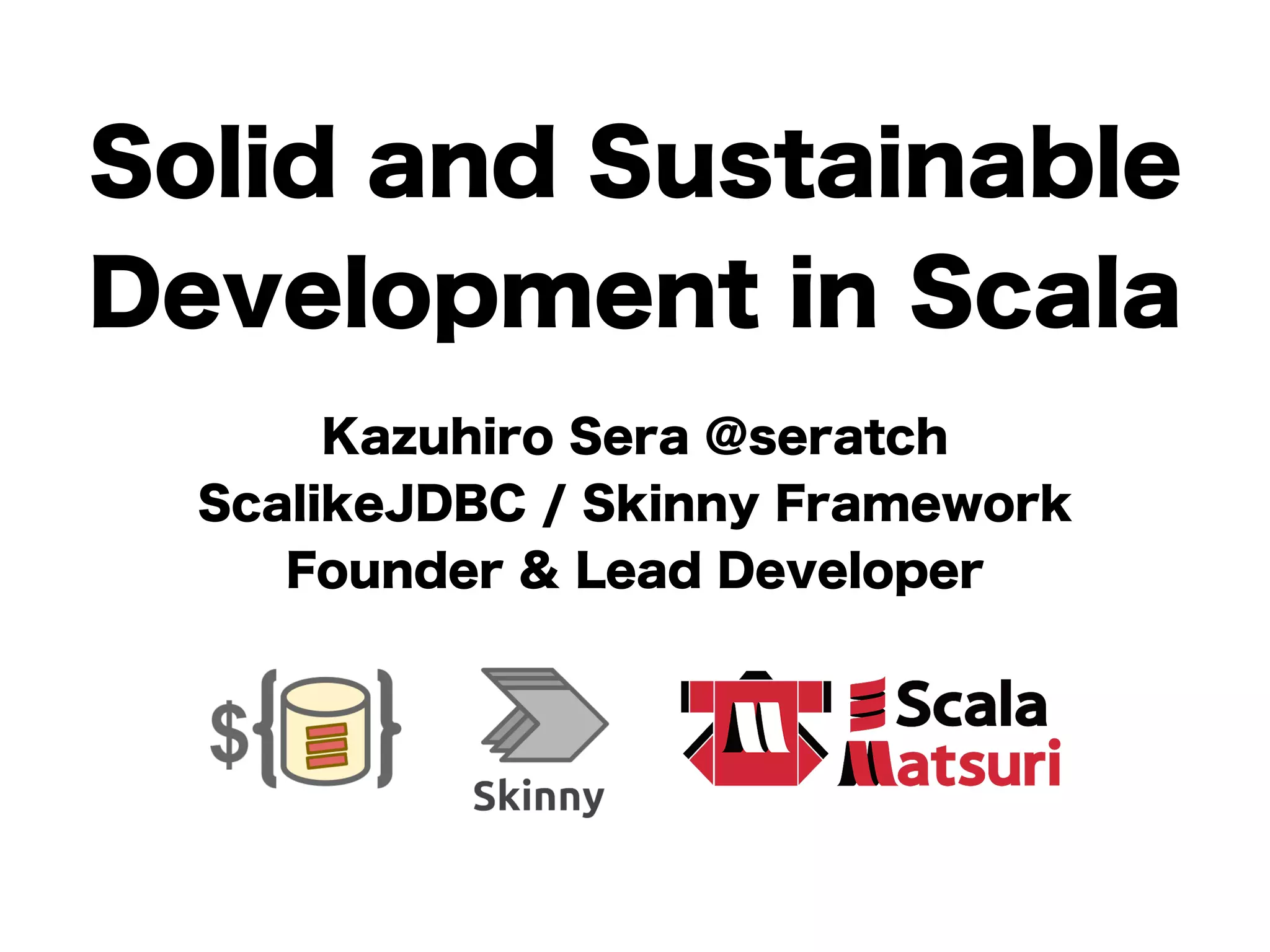

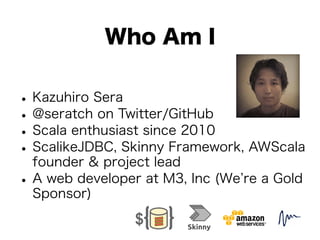
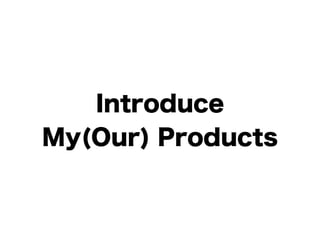
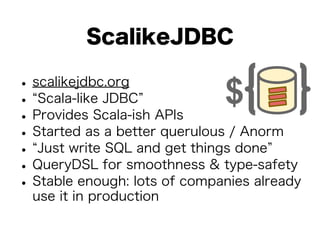
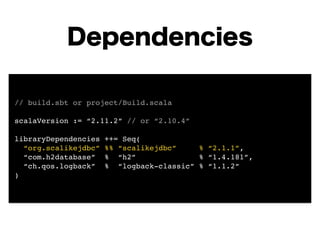
![Basic Usage
import scalikejdbc._!
!
ConnectionPool.singleton(!
“jdbc:h2:mem:matsuri”, !
“user”, “secret”)!
SQL statement!
(PreparedStatement)
!
DB autoCommit { implicit session =>!
Side effect !
with DB connection
sql”create table attendee (name varchar(32))”.execute.apply()!
val name = “seratch”!
sql”insert into attendee (name) values ($name)”.update.apply()!
}!
!
val names: Seq[String] = DB readOnly { implicit s =>!
sql”select name from attendee”!
.map(_.string(“name”)).list.apply()!
}
execute/update!
(JDBC operation)
Extractor](https://image.slidesharecdn.com/scalamatsuri2014-140906020107-phpapp02/85/Solid-And-Sustainable-Development-in-Scala-7-320.jpg)
![QueryDSL
import scalikejdbc._!
case class Attendee(name: String)!
object Attendee extends SQLSyntaxSupport[Attendee] {!
def apply(rs: WrappedResultSet, a: ResultName[Attendee]) = !
new Attendee(rs.get(a.name))
}!
!
implicit val session = AutoSession!
!
!
val a = Attendee.syntax(“a”)!
val seratch: Option[Attendee] = withSQL {!
QueryDSL!
(Mostly SQL)
Actual SQL Query
select.from(Attendee as a).where.eq(a.name, “seratch”)!
}.map(rs => new Attendee(rs, a)).single.apply()!
!
// select a.name as n_on_a from attendee a where a.name = ?](https://image.slidesharecdn.com/scalamatsuri2014-140906020107-phpapp02/85/Solid-And-Sustainable-Development-in-Scala-8-320.jpg)
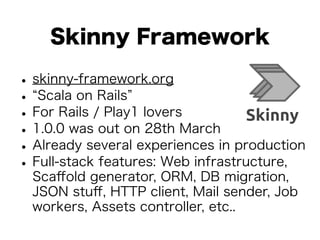
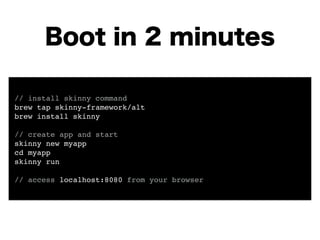
![Model (DAO)
import skinny.orm._!
Entity
import scalikejdbc._!
!
case class User(id: Long, name: Option[String])!
!
// companion: data mapper!
object User extends SkinnyCRUDMapper[User] {!
def defaultAlias = createAlias(“u”)!
def extract(rs: WrappedResultSet, u: ResultName[User])!
= autoConstruct(rs, u)
}!
CRUD Mapper Object!
!
(No need to be companion)
User.findById(123)!
User.count()!
User.createWithAttributes(‘name -> “Alice”)!
User.updateById(123).withAttributes(‘name -> “Bob”)!
User.deleteBy(sqls.eq(u.name, “Bob”))
Smooth APIs](https://image.slidesharecdn.com/scalamatsuri2014-140906020107-phpapp02/85/Solid-And-Sustainable-Development-in-Scala-11-320.jpg)
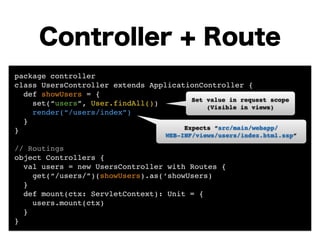
![View Template
// src/main/webapp/WEB-INF/views/users/index.html.ssp!
!
<%@val users: Seq[User] %>!
!
<table class=“table”>!
#for (user <- users)!
<tr>!
<td>${user.id}</td>!
<td>${user.name}</td>!
</tr>!
#end!
</table>
import from request scope
Loop, if/else syntax!
in Scalate](https://image.slidesharecdn.com/scalamatsuri2014-140906020107-phpapp02/85/Solid-And-Sustainable-Development-in-Scala-13-320.jpg)
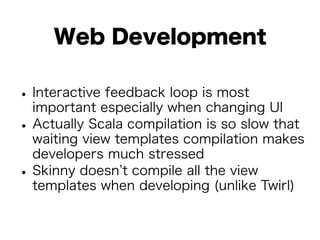

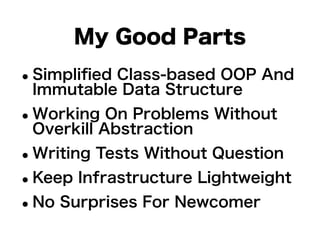
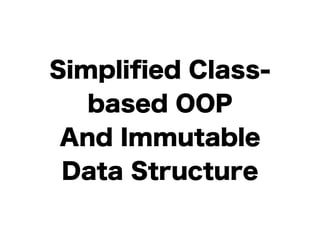
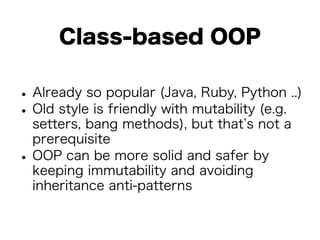
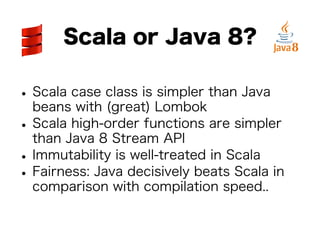
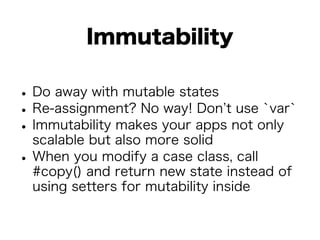
![Immutable Entity
// entity with behaviors!
case class User(id: Long, name: Option[String])!
extends SkinnyRecord[User] {!
override def skinnyCRUDMapper = User
}!
// data mapper!
object User extends SkinnyCRUDMapper[User] {!
override def defaultAlias = createAlias(“u”)!
override def extract(rs: WrappedResultSet, u: ResultName[User])!
= autoConstruct(rs, u)
}!
!
val noNames: Seq[User] = User.where(‘name -> “”).apply()!
val anons: Seq[User] = noNames.map { user => !
user.copy(name = “Anonymous”).save()!
}
Both of “noNames” and
“anons” are immutable](https://image.slidesharecdn.com/scalamatsuri2014-140906020107-phpapp02/85/Solid-And-Sustainable-Development-in-Scala-21-320.jpg)
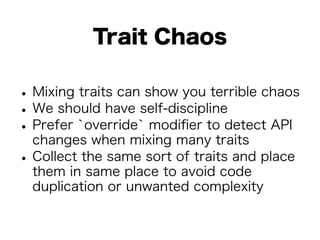
: A = {!
val before = millis!
val result = action!
logger.debug(“Elapsed time: ${millis - before} millis”)!
result
}!
}](https://image.slidesharecdn.com/scalamatsuri2014-140906020107-phpapp02/85/Solid-And-Sustainable-Development-in-Scala-23-320.jpg)
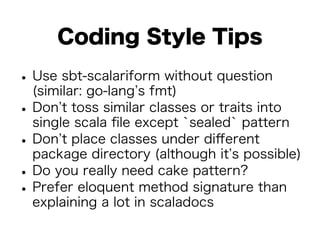

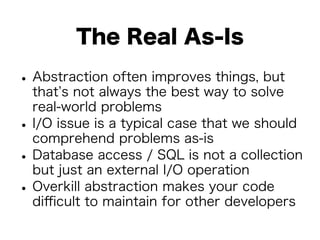
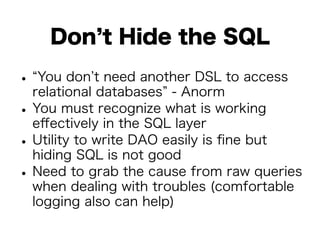
![SQL Ops As-Is
// A programmer belongs to a company and has several skills!
!
implicit val session = AutoSession!
!
val p: Option[Programmer] = withSQL {!
I believe everybody can
understand this code
select.from(Programmer as p)!
.leftJoin(Company as c).on(p.companyId, c.id)!
.leftJoin(ProgrammerSkill as ps).on(ps.programmerId, p.id)!
.leftJoin(Skill as s).on(ps.skillId, s.id)!
.where.eq(p.id, 123).and.isNull(p.deletedAt)!
}!
.one(rs => Programmer(rs, p, c))!
Extracts one-to-many
.toMany(rs => Skill.opt(rs, s))!
relationships here
.map { (programmer, skills) => programmer.copy(skills = skills) }!
.single!
.apply()](https://image.slidesharecdn.com/scalamatsuri2014-140906020107-phpapp02/85/Solid-And-Sustainable-Development-in-Scala-28-320.jpg)
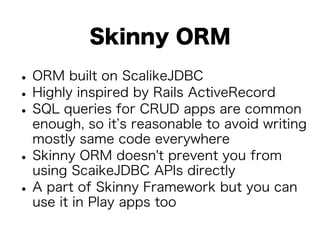
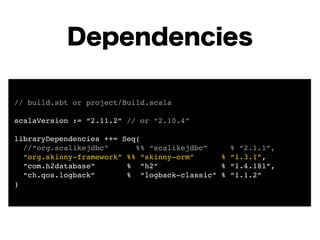
![Mappers
// entities!
case class Company(id: Long, name: String)!
case class Employee(id: Long, name: String,!
companyId: Long, company: Option[Company])!
!
// mappers!
object Company extends SkinnyCRUDMapper[Company] {!
def extract(rs: WrappedResultSet, rn: ResultName[Company]) =!
autoConstruct(rs, rn)
}!
object Employee extends SkinnyCRUDMapper[Employee] {!
def extract(rs: WrappedResultSet, rn: ResultName[Employee]) =!
autoConstruct(rs, rn, “company”)!
// simple association definition!
lazy val companyRef = belongsTo[Company](!
Company, (e, c) => e.copy(company = c))
}](https://image.slidesharecdn.com/scalamatsuri2014-140906020107-phpapp02/85/Solid-And-Sustainable-Development-in-Scala-31-320.jpg)
![Reasonable?
Right, these CRUD operations are not SQL-ish. However, I believe
they’re reasonable because these patterns are already common enough.
!
!
val companyId = Company.createWithAttributes(‘name -> “Sun”)!
val empId = Employee.createWithAttributes(!
‘name -> “Alice”, ‘companyId -> companyId)!
!
val emp: Option[Employee] = Employee.findById(empId)!
val empWithCompany: Option[Employee] = !
Employee.joins(companyRef).findById(123)!
!
Company.updateById(companyId).withAttributes(‘name -> “Oracle”)!
!
val e = Employee.defaultAlias!
Employee.deleteBy(sqls.eq(e.id, empId))!
Using ScalikeJBDC API!
Company.deleteById(companyId)
is also possible](https://image.slidesharecdn.com/scalamatsuri2014-140906020107-phpapp02/85/Solid-And-Sustainable-Development-in-Scala-32-320.jpg)

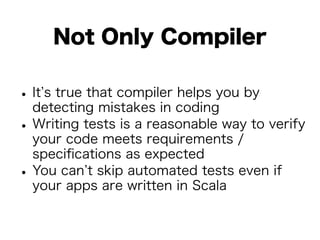
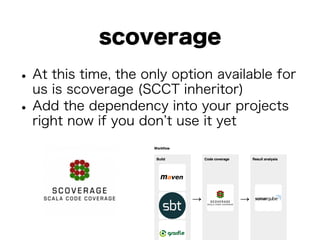

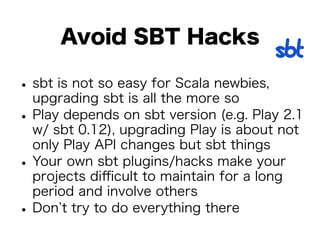
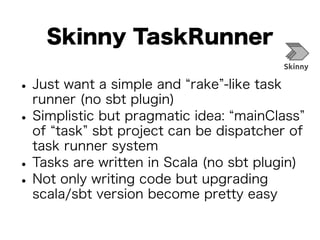
![Tasks
// sbt settings!
// mainClass := Some("TaskRunner")!
!
// task/src/main/scala/TaskRunner.scala!
object TaskRunner extends skinny.task.TaskLauncher {!
register("assets:precompile", (params) => {!
val buildDir = params.headOption.getOrElse(“build")!
// AssetsPrecompileTask is a Scala object!
skinny.task.AssetsPrecompileTask.main(Array(buildDir))!
})!
}!
Pure Scala function!
!
// skinny task:run assets:precompile [dir]
task name
mainClass as the dispatcher](https://image.slidesharecdn.com/scalamatsuri2014-140906020107-phpapp02/85/Solid-And-Sustainable-Development-in-Scala-39-320.jpg)
